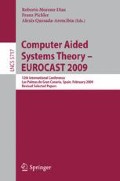Abstract
This paper presents a disambiguation method that diminishes the functional combinations of the words of a sentence taking into account the context in which they appear. This process uses an algorithm which does the syntactic analysis of every functional combination of the sentece. In order to control this analysis, a grammar with restrictions has been developed to model the valid syntactic structures of the Spanish language. The main target of our algorithm is the separation between the disambiguation method and the grammar which governs it.
Access this chapter
Tax calculation will be finalised at checkout
Purchases are for personal use only
Preview
Unable to display preview. Download preview PDF.
References
Chomsky, N.: Syntactic Structures. The Hague, Mouton (1957)
Losada, L.: Automatización del análisis sintáctico del español. Phd thesis, University of Las Palmas de Gran Canaria (2002)
Quesada, J.: Un modelo robusto y eficiente para el análisis sintáctico de lenguajes naturales mediante árboles múltiples virtuales. Centro Informático Científico de Andalucía, CICA (1996)
Quesada, J.: El algoritmo SCP de análisis sintáctico mediante propagación de restricciones. Phd thesis, University of Sevilla (1997)
Santana, O., Pérez, J., Hernández, Z., Carreras, F., Rodríguez, G.: FLAVER: Flexionador y lematizador automático de formas verbales. Lingüística Española Actual XIX 2, 229–282 (1997)
Santana, O., Pérez, J., Duque, J., Hernández, Z., Rodríguez, G.: FLANOM: Flexionador y lematizador automático de formas nominales. Lingüística Española Actual XXI 2, 253–297 (1999)
Santana, O., Pérez, J., Losada, L., Carreras, F.: Hacia la desambiguación funcional automática en Español. Procesamiento del Lenguaje Natural 1(3), 1–15 (2002)
Santana, O., Pérez, J., Losada, L., Carreras, F.: Bases para la desambiguación estructural de árboles de representación sintáctica. Procesamiento del Lenguaje Natural 32, 43–65 (2004)
Author information
Authors and Affiliations
Editor information
Editors and Affiliations
Rights and permissions
Copyright information
© 2009 Springer-Verlag Berlin Heidelberg
About this paper
Cite this paper
Santana Suárez, O., Pérez Aguiar, J.R., Santana Pérez, I., Quesada López, R. (2009). Functional Disambiguation Using the Syntactic Structures Algorithm for Each Functional Interpretation for Spanish Language. In: Moreno-Díaz, R., Pichler, F., Quesada-Arencibia, A. (eds) Computer Aided Systems Theory - EUROCAST 2009. EUROCAST 2009. Lecture Notes in Computer Science, vol 5717. Springer, Berlin, Heidelberg. https://doi.org/10.1007/978-3-642-04772-5_30
Download citation
DOI: https://doi.org/10.1007/978-3-642-04772-5_30
Publisher Name: Springer, Berlin, Heidelberg
Print ISBN: 978-3-642-04771-8
Online ISBN: 978-3-642-04772-5
eBook Packages: Computer ScienceComputer Science (R0)

